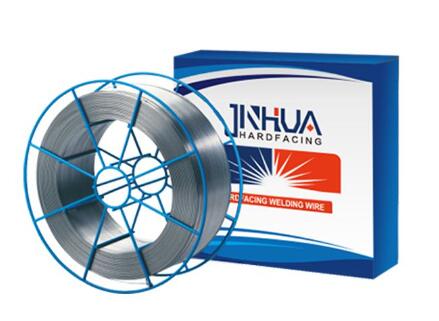1. Types and characteristics of flux cored hardfacing welding wire
According to the structure of the wire, flux cored hardfacing welding wire can be divided into two types of seamed wire and seamless wire. Seamless wire can be coated with copper. Seamless wire with good performance and low cost has become the direction of future development.
According to whether there is a protective gas, flux cored hardfacing welding wire can be divided into gas-protected wire and self-protected wire. Flux cored hardfacing welding wire core powder composition is similar to that of the welding electrode flux, containing arc stabilizer, deoxidizer, slagging agent and alloying agent. According to the flux cored hardfacing welding wire inner filler powder with or without slagging agent, can be divided into "flux powder type" wire and "metal powder type" wire. According to the alkalinity of the slag, can be divided into titanium type, titanium calcium type and calcium type welding wire.

Titanium-type slag flux cored hardfacing welding wire welding channel forming beautiful, all-position welding into the process performance, arc stability, small spatter, but the weld metal toughness and crack resistance is poor. In contrast, the calcium slag flux cored hardfacing welding wire has excellent weld toughness and anti-cracking properties, but the weld channel formation and welding process performance is slightly worse. Titanium calcium slag system between the above two.
"Metal powder" flux cored hardfacing welding wire welding process performance is similar to solid cored wire. Its deposition efficiency and anti-cracking properties are better than the "flux powder" wire. Most of the powder cores are metal powder (iron powder, deoxidizer, etc.), and special arc stabilizer is added to ensure less slag, high efficiency, low spatter and stable arc during welding. In addition, the low hydrogen diffusion content of the weld improves the anti-cracking performance.
The cross-sectional shape of the flux cored hardfacing welding wire has a great impact on the welding process performance and metallurgical properties. According to the cross-sectional shape of flux cored hardfacing welding wire can be divided into two categories: simple O-shaped and complex cross-sectional folding shape, which can be divided into plum-shaped, T-shaped, E-shaped and intermediate wire filling shape.
The more complex and symmetrical the cross-sectional shape of the flux cored hardfacing welding wire, the more stable the arc. The metallurgical reaction and protection of the flux core is more adequate. But as the diameter of the wire decreases, this difference is gradually reduced, when the diameter of the wire is less than 2 mm, cut into the shape of the impact is no longer obvious.
Flux cored hardfacing welding wire has good welding process performance, good weld quality, and strong adaptability to steel. It can be used to weld various types of steel structures, including low carbon steel, low alloy high strength steel, low temperature steel, heat-resistant steel, stainless steel and wear-resistant overlay welding. The shielding gases used are CO2 and Ar + CO2, the former for common structures, the latter for important structures. Flux cored hardfacing welding wire is suitable for automatic or semi-automatic welding, DC or AC arc are required.
2. Low carbon steel and high strength steel flux cored hardfacing welding wire
Most of these wires are titanium-type slag system, good welding technology, high welding productivity. Mainly used in shipbuilding, bridges, construction, vehicle manufacturing, etc. Low-carbon steel and high-strength steel flux cored hardfacing welding wire varieties, from the weld strength level of 490MPa tensile strength and 590Mpa level of flux cored hardfacing welding wire has been commonly used. From the performance point of view, some focus on the process performance, some focus on the mechanical properties of the weld and crack resistance, some are suitable for all-position welding, including downward vertical welding, and some are dedicated to the fillet weld.
3. Flux cored hardfacing welding wire for stainless steel
Stainless steel flux cored hardfacing welding wire has more than 20 kinds of mouth, in addition to chromium-nickel stainless steel flux cored hardfacing welding wire, there are chromium stainless steel flux cored hardfacing welding wire. Wire diameter of 0.8, 1.2, 1.6 mm, etc., to meet the needs of stainless steel thin plate, medium plate and thick plate welding. Most of the shielding gas used is CO2, can also be used Ar + (20% to 50%) CO2 gas mixture.
4. Flux cored hardfacing welding wire for wear-resistant overlay welding
In order to increase the wear resistance or make the metal surface obtain certain special properties, it is necessary to transition a certain amount of alloying elements from the wire. However, the wire is difficult to process and manufacture because it contains more carbon and alloying elements. With the introduction of flux cored hardfacing welding wire, these alloying elements can be added to the flux core, and processing and manufacturing is convenient. Therefore, the use of flux cored hardfacing welding wire for submerged arc overlay welding wear-resistant surfaces is a common method, and has been widely used. In addition, by adding alloying elements to the sintered flux, the overlay layer of the corresponding composition can be obtained after overlay welding. It can be used in combination with solid or flux cored hardfacing welding wire to meet different overlay requirements.
We are a flux cored hardfacing welding wire supplier. If you are interested in our products, please contact us now!




Comments
Please Join Us to post.
0